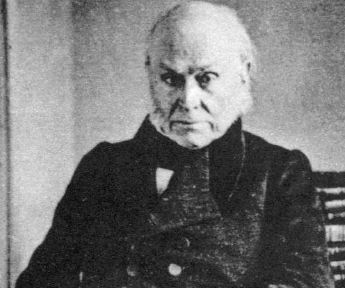I’ve developed an odd habit as I’ve gotten into this project: every time I pick up a book about a president now, the first place I look is at the end of the book, for the death and burial information. This week I got hold of a galley of an upcoming biography of Old Man Eloquent, John Quincy Adams, and sure enough, I flipped past the whole of one of the more interesting lives in American history – son of the second president, seasoned diplomat, architect of the Monroe Doctrine, president, distinguished congressman and fiery antislavery advocate – to read about the stroke he suffered on the floor of the House and how he was buried in the family crypt. (Should I have put a spoiler alert in front of this? Nah.)
I did end up going back through more of the book – I still have a long way to go, but I stayed up late reading about his final years fighting the congressional “gag rule” that blocked any bills or petitions that would interfere with slavery. The book presents him as a kind of badass grandpa, defying rules, furious southern congressmen, even death threats to push back on the gag rule, with a rationale that was something like this:
a) I’m old, so what have I got to lose;
b) I’m John Freaking Quincy Adams.
Honestly, looking at that picture above, you can see a guy who’s not easily going to be denied. Sure enough, he got the gag rule removed.
The author argues that the gag rule episode and Adams’ vocal antislavery stance made him into a even bigger national figure than he’d been as president decades before, and that when he died (unsurprisingly, the last thing he said on the House floor before his stroke was “NO!”) even his biggest foes in Congress had to tip their hats to his determination and his long record of public service.
I bring this up partly because I’m slightly afraid of him and want to make sure he doesn’t find a way to hurt me from beyond the grave for not lauding him enough, but also because a lot of the stories I’m reading about the presidents come down to redemption or reconciliation. John Quincy Adams the man is and was widely respected, but John Quincy Adams the president has long been thought of as not so great. The book I’m reading suggests Adams’ second act (or maybe third or fourth?) was where he restored his reputation as a Great American.
This comes up again and again with presidents – not always, but often enough that it’s a theme. William Howard Taft ran the least successful reelection campaign in history, but rebuilt his good name as Chief Justice. Herbert Hoover left the White House as the somewhat despised symbol of the Great Depression, but spent his long post-presidential career in (what else) public service and restoring his reputation. More recently, Jimmy Carter went from “Malaise Forever” to Nobel laureate, and Richard Nixon, who seemed destined to have “resigned in disgrace” chiseled into his tombstone, was eulogized by President Bill Clinton, whose wife had worked as a lawyer for a committee investigating Watergate.
Of course, not every president is so lucky. James Buchanan wrote “history will vindicate my memory.” Which is true, if by “memory” you mean his ability to recall information. Vindicating the memory of his presidency… yeahno.

